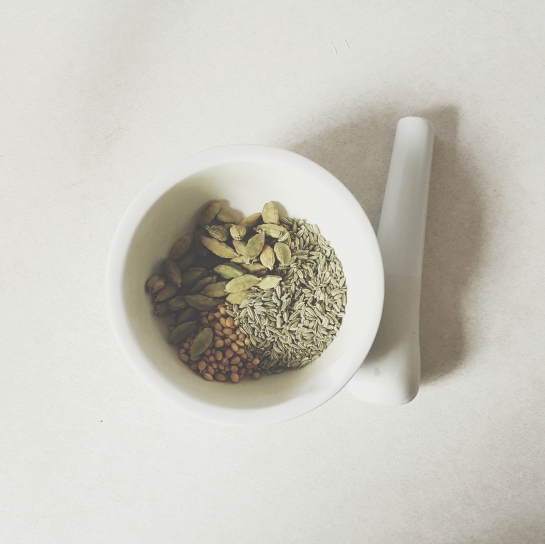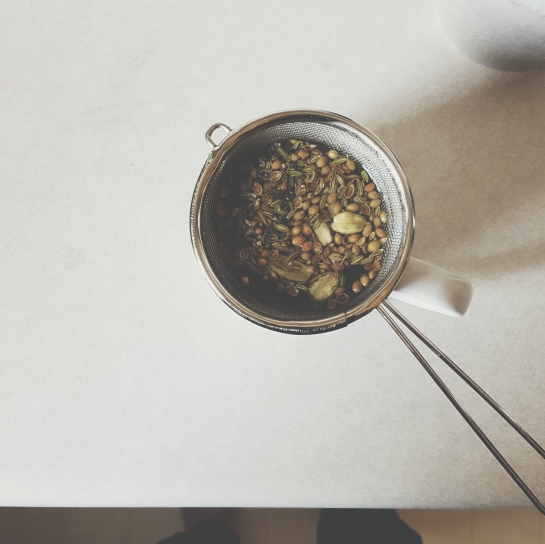This past September has marked eight years of teaching yoga, and fifteen years since I started studying food science formally. Over the years, yoga has been a template to help figure out how to live well, and food has been an equally interesting medium for that too.
In the journey of navigating life (and deciding what to eat), I have always loved reading about all things food: cookbooks, memoirs of chefs, ethics regarding food production and agriculture, the history of cutlery, the science of flavour, and on and on. Recently I’ve been doing some thinking and reading on the evolution of food trends – and the dangers, contradictions, and benefits that can transpire. While I think I’ll always be intellectually intrigued by food trends, I don’t think many of them will end up on my dining table in a serious way. Perhaps I’m a little worn out (trying to live a good life can be tiring, ironically), but arriving at this conclusion is mostly due to seeing firsthand how trends are uplifted and prolonged due to the desire for market share and positive quarterly reports. While it’s depressing to consider the troubles we now have from mass-producing food (and it’s sexy to hate on big multinationals), I’ve been on that side and can understand that everyone has to make a living (even Employee #58260). The unfortunate part is that we seem to all have different ideas about how best to go about that. While people smarter than me work on that problem, what strikes my curiosity is the sanctimonious fervour in which a certain food or way of eating is uplifted as the universal remedy for all ailments (real or imagined), and how that feels somewhat unjustified, especially in the light of graceless commerce.
And, in the light of logic. In fact, there was one particular situation many years ago that really crystallized for me how food trends are so myopically temporal: I was asked at my job to formulate a trans-fat-free mayonnaise…that was going to be served on a piece of fried chicken. With a side of fries. I didn’t know if it could get more painfully absurd than that.
For all my research, I’m still unsure about how food trends start, but anyhow I’m more interested in what happens after. Moreover, science and its data seem to matter less and less. Outside of financial gain and scientific studies, it seems that right now, there is a large sect that subscribe to the notion that eating certain foods has become dirty and sinful, while other foods have become purifying and cleansing. The delineation seems based more on feeling than fact. Gluten-free foods will apparently cure you of everything from anxiety to cancer, while sourdough bread (with gluten, by the way) will put you in touch with Mother Nature, soil, and Getting Back to the Land.
Self-imposed dietary restriction has become an indicator of morality and self-worth via discipline, while at the same time indulgence has become a form of brazen self-care. And mostly among women. Fries before guys! Doughs before bros! With the caveat that you are already thin and fit-looking (and heterosexual, though I guess it is also about the rhyming)…
Can the act of eating really be a form of repentance? Are we truly better people if we don’t eat this, but eat that? While discipline is certainly a useful quality to cultivate, and we need some form in which to do that, I wonder if one takes it too far when deciding to cut out all carbs.
It seems to me that at the root of all this is a feeling that we are not enough. A sense of inadequacy seems to be the all-pervasive malaise of those afforded the luxury of too many food and dietary choices. Dissatisfaction, shame, insecurity, vulnerability – all of these states are so difficult to sit with and we can find a welcome distraction through the safety of food rules. This is allowed, this is not allowed. This will make me feel worthy. This will not make me feel worthy. It simplifies a nuanced, complicated world.
It’s all so sticky. But maybe sticky can end up being good, like local raw honey?! The practice of yoga teaches us that there is a way to navigate through all of this. Learning to sit with what arises, to hold space without pushing away or judging – through this we can have healthier relationships with ourselves, and moreover, the things we consume. Eating clean won’t make you feel like you are enough, because you are already enough. But it takes some work to truly believe that.
Navigating one’s way through life can be difficult at times, and the way each individual chooses to go about it is deeply personal. And it is incredible how we have so many unique ways of feeling about and treating food. So when I start to go cross-eyed about it all, I try to remind myself of the following to put it all in perspective, especially when it comes to eating and health: that everyone’s time runs out, and we can only delay the inevitable, but hopefully we can find some joy and pleasure in that journey.
So while we keep trying to figure it all out, here is a tea concoction that can hopefully contribute to some of that joy. This is a classic combination of spices found in Ayurveda, the healing modality that historically developed alongside yoga. Ayurveda means, “philosophy of living” – so you can see why I like studying it! – and offers an interesting way of viewing the world that emphasizes relationship, cause and effect, and interconnectedness.
One of the most important aspects of Ayurveda is digestion – not just of food but also thoughts, emotions and experiences. And if that seems to fall on the side of feel-goodery woo-woo, recent studies have shown how sleep is important for our brains to have the opportunity to “scrub” clean of toxins built up from thinking our thoughts over the course of the day – which is the same thing that happens when you meditate! – aka, mental digestion. Hooray!
According to Ayurveda, this particular blend of three spices are good for all body types, and is supposed to help with digestion by preventing bloating (and farts!) and promoting urine flow (pee pee!)
To be honest though, I love it because I love cardamom.
Cardamom is one of those enigmatic flavours that I can’t quite put my finger on. It is subtle, yet distinctive. It is a spice that embodies the question without worrying about finding the answer, and perhaps that is a good suggestion for how living well feels like – living that is grounded in a sense of wonder and playfulness.
And, maybe, a little logic.
Cardamom, coriander, fennel tea
2 tsp cardamom seeds
2 tsp coriander seeds
2 tsp fennel seeds
Lightly crush seeds with mortar and pestle. Use 3/4 tsp of the mixture to 2 cups of hot water. Steep for 5 minutes. Feel free to sweeten, but it’s pretty lovely as it is. Store the rest of the mixture in a jar for next time.

